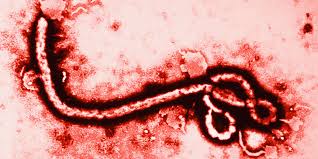As the deadly Ebola virus spreads in Western African countries, and as sometimes irrational fears about the growing epidemic spread throughout the world, China is sending doctors and military aid to the three countries most affected. As Christina Larson reports for Science Magazine, the Chinese government has many reasons for sending aid:
Already about 200 medical workers and advisers from China are now stationed in the three West African countries fighting Ebola outbreaks: Sierra Leone, Liberia, and Guinea. George Gao, deputy director-general of the Chinese Center for Disease Control and Prevention (China CDC), runs a mobile testing lab in the capital of Sierra Leone. Reached by phone there in Freetown, Gao says his team performs 40 to 60 blood tests a day. In addition to diagnosing the disease in patients, it’s crucial to test corpses; if a patient has died from Ebola, it’s imperative to refrain from traditional burial practices in West Africa such as washing or touching the deceased or giving a “final kiss,” Gao says.
[…] When asked by a reporter to explain China’s generosity, Lin pointed out that there are now 25,000 Chinese businesses registered in Africa and that China is the continent’s largest trading partner. Moreover, he added, Beijing sees African capitals as political allies. “Over the past half-century, China and Africa have come to work more closely together. Also, we will not forget that our African brothers restored China’s seat on the U.N. Security Council,” a reference to the 1971 vote tally that gave Taiwan’s former position on the council to the People’s Republic. [Source]
Yet despite the prevalence of Chinese businesses and individuals now in Africa, the private sector has done little to contribute to the fight against Ebola, due primarily to an “immature” philanthropic sector, according to a report by Megha Rajagopalan in Reuters:
Charity experts say Chinese construction firms with projects in the worst affected regions could donate building materials and labor. “They could easily step in and say: ‘we’ll help you clear roads and put in emergency roads and clinics’,” said Gary Rieschel, managing partner at Qiming Venture Partners. “If they put their shoulders behind moving some of the infrastructure for healthcare, they could be incredibly valuable.”
Fang at the Ministry of Commerce said aid from Chinese firms should be led and coordinated by the government.
“They’re unlikely to come forward independently and would assume the government, which does have experience in contributing for emergencies, will be better at knowing what to do,” said Deborah Brautigam, director of the China Africa Research Initiative and a professor at Johns Hopkins University. [Source]
Many in the government and elsewhere are touting China’s experience dealing with the SARS virus in 2003 as preparation for training other countries how to handle Ebola. Chinese authorities are also taking precautions to avoid the spread of Ebola inside their borders, with a steady flow of travelers to and from affected countries, especially to Guangdong. Natasha Khan reports for Bloomberg:
As Ebola has reached the U.S. and Europe, China has ordered designated hospitals to stockpile equipment, disinfectants and protective gear and map out detailed directions for medical workers. In the southern province of Guangdong, which receives more than 100 direct flights from Africa each month, thousands of people are being monitored.
“After SARS, China doesn’t want to be in the same situation again,” said Ben Cowling, an associate professor of infectious disease epidemiology at the University of Hong Kong’s School of Public Health. “In the last 10 years, they’ve built up massive capacity to respond to this kind of situation, to avoid damage to public health and prevent the socio-economic problems that arise with it.”
In Guangdong, Chinese authorities tracked 8,672 visitors from Ebola-hit countries in the two months through Oct. 21, a government release said, without giving details on the screening process. More than 5,000 are no longer being monitored. [Source]
Doctors who have traveled to Ebola-hit countries to help with medical aid will be quarantined for 21 days upon their return.
Some Africans living in China have been monitored and had their travels limited due to Ebola fears, even if they come from countries not affected by the disease. From Patti Waldmeir and Lucy Hornby of the Financial Times:
China, with its 1.4 billion population and overcrowded cities, has had no confirmed cases of Ebola, and controls on the media appear to have kept the level of public concern relatively low. Beijing will do whatever it takes to keep Ebola out of China, including in effect banning some Africans from the Canton fair and enlisting hotels to help monitor others. [Source]
See also a Financial Times video on anti-Ebola precautions taken in the trading town of Yiwu.







